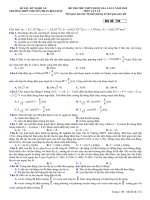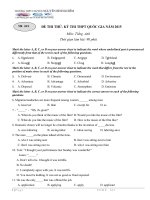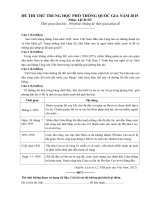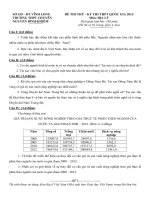Tải Đề thi thử THPT Quốc gia 2015 môn Tiếng Anh trường THPT Chuyên Nguyễn Bỉnh Khiêm, Vĩnh Long - Đề thi thử đại học môn Tiếng Anh có đáp án
Bạn đang xem bản rút gọn của tài liệu. Xem và tải ngay bản đầy đủ của tài liệu tại đây (149.19 KB, 8 trang )
<span class='text_page_counter'>(1)</span><div class='page_container' data-page=1>
<b> ĐỀ THI THỬ- KỲ THI THPT QUỐC GIA NĂM 2015</b>
<i>Môn: Tiếng Anh</i>
<i>Thời gian làm bài: 90 phút</i>
<i><b>Mark the letter A, B, C, or D on your answer sheet to indicate the word whose underlined part is pronounced</b></i>
<i><b>differently from that of the rest in each of the following questions.</b></i>
<b>1.A. Handsome </b> <b>B. Endangered</b> <b>C. Arrange</b> <b>D. Tableland</b>
<b>2.A. Kissed </b> <b>B. Stopped</b> <b>C. Close</b> <b> D. Laughed</b>
<i><b>Mark the letter A, B, C, or D on your answer sheet to indicate the word that differs from the rest in the </b></i>
<i><b>position of main stress in each of the following questions.</b></i>
<b>3.A. Delivery</b> B. Climatic C. Ornamental D. Environment
<b>4.</b> A. Adventure B. Advantage C. Adverbial D. Advertise
<b>5. A. Disposal </b> B. Volcanic C. Atmosphere D. Emission
<i><b>Mark the letter A, B, C, or D on your answer sheet to indicate the correct answer to each of the following </b></i>
<i><b>questions. </b></i>
6. Migraine headaches are more frequent among women ______ among men.
A. however B. than C. except for D. as
7. - “_____” - "Oh, it's great!"
A. What do you think of the music of the film? B. Would you like the music of the film?
C. What do you like the music of the film? D. How is the music of the film like?
8. Domestic chores will no longer be a burden thanks to the invention of _____devices.
A. save-laboring B. saving-labor C. labor-saving D. laboring-save
9. The man _____on the plane talked all the time.
A. who I was sitting next B. that I was sitting next to him
C. that I was sitting next to D. who I was sitting next him
10. Tom: “I thought your performance last Sunday was wonderful.”
Laura: “_____.”
A. Don’t tell a lie. I thought it was terrible.
B. No doubt!
C. I completely agree with you. It was terrific.
D. You must be kidding. It was not as good as I had expected.
11. He was the only_____ that was offered the job.
A. application B. applying C. apply D. applicant
</div>
<span class='text_page_counter'>(2)</span><div class='page_container' data-page=2>
12. Don’t forget_____ home as soon as you arrive at your destination!
A. callingB. to call C. having called D. call
13. The leaves of the white mulberry provide food for silkworms, ______ silk fabrics are woven.
A. from whose cocoons B. from cocoons
C. whose cocoons are from D. whose cocoons
14. ____with the size of the whole earth, the highest mountains do not seem high at all.
A. If you compare B. Compare them C. When compared D. A comparison
15. I don’t like hunting. - _____.
A. Either do I B. I do, too C. Neither do I D. I don’t neither
16. _____that life began billions of years ago in the water.
A . In the belief B. It is believed C. The belief D. Believed
17. ______ is present in the body in greater amounts than any other mineral.
A .There is calcium B. Calcium C. Calcium, which D. It is calcium
18. If you want to lose weight, you’ll have to _____ less.
A. get used to eat B. be used to eat C. get used to eating D. used to eat
19. Keep quiet! You ______ talk so loudly in here. Everybody is working.
A. mustn’t B. must C. needn’t D. need
20. Nam’s been studying really hard, ______ he can pass the exams.
A. but B. therefore C. however D. so
21. Pearl Sydenstricker Buck, ______ the Nobel Prize for Literature in 1938, is best-known for her novels about
China.
A. who won B. winner of C. to win D. who the winner of
22. They’re staying with us______ the time being until they can afford a house.
A. during B. at C. for D. in
23. Most species of heliotropes are weeds, ______ of them are cultivated.
A.some B. but some C. for some species D. some spices
24. She _____her homework before eight o’clock last night.
A. finished B. has finished C. had finished D. was finished
<i><b>Mark the letter A, B, C, or D on your answer sheet to indicate the word(s) SIMILAR in meaning to the </b></i>
<i><b>underlined word(s) in each of the following questions.</b></i>
<b>6. Childrearing is the women’s most wonderful role.</b>
A. Giving birth to a baby B. Having no child
C. Bringing up a child D. Educating a child
</div>
<span class='text_page_counter'>(3)</span><div class='page_container' data-page=3>
A. number B. changes C. conservation D. variety
<b>8.Everybody was panicked when the bomb exploded.</b>
A. showed off B. went off C. took off D. turned up
<b>9.They decided to postpone their journey till the end of the month because of the epidemic.</b>
A. put off B. take up C. turn round <b> D. do with</b>
<b>10. The ASEAN Para-Games are hosted by the same country where the SEA Games took place.</b>
A. organized B. impressed C. participated D. defended
<i><b>Mark the letter A, B, C, or D on your answer sheet to show the underlined part that needs correction. </b></i>
<b>11. When I entered (A) the room, I found (B) my young son to stand (C) on (D) the kitchen table. </b>
<b>12. The total thickness of the ventricular walls (A) of the heart are (B) about (C) three times that (D) of the </b>
atria.
<b>13. There are (A) about 350 species and subspecies of birds in danger of become (B) extinct, with a large </b>
number of them (C), 117 in all (D), found on oceanic islands.
<b>14. Kangaroos use their (A) long and powerful (B) tails for (C) balance themselves when sitting (D) upright or </b>
jumping.
<b>15. Daniel said that if he had (A) to do another (B) homework tonight, he would not be able (C) to attend (D) </b>
the concert.
<i><b>Read the following passage and mark the letter A, B, C, or D to indicate the correct answer to each of the </b></i>
<i><b>questions.</b></i>
<i><b>Human memory, formerly believed to be rather inefficient, is really more sophisticated than that of a</b></i>
computer. Researchers approaching the problem from a variety of points of view have all concluded that there is
a great deal more stored in our minds than has been generally supposed. Dr. Wilder Penfield, a Canadian
neurosurgeon, proved that by stimulating his subjects’ brains electrically, he could elicit the total recall of
<i><b>specific events in their lives. Even dreams and other minor events supposedly forgotten for many years</b></i>
<i><b>suddenly emerged in detail.</b></i>
The memory trace is the term for whatever is the internal representation of the specific information
about the event stored in the memory. Assumed to have been made by structural changes in the brain, the
memory trace is not subject to direct observation but is rather a theoretical construct that we use to speculate
about how information presented at a particular time can cause performance at a later time. Most theories
include the strength of the memory trace as a variable in the degree of learning, retention, and retrieval possible
for a memory. One theory is that the fantastic capacity for storage in the brain is the result of an almost
unlimited combination interconnection between of brain cells, stimulated by patterns of activity. Repeated
references to the same information support recall. Or, to say that another way, improved performance is the
<i><b>result of strengthening the chemical bonds in the memory.</b></i>
<b>16.</b> According to the passage, human memory ______
A. can store less than what people thought
B. was thought to be more efficient than it is supposed
C. is more complex than computer memory
</div>
<span class='text_page_counter'>(4)</span><div class='page_container' data-page=4>
<i><b>17. The word that in paragraph 1 refers to ______. </b></i>
A. human memory B. the problem C. the memory D. the sophistication
<b>18. According to the passage, Dr. Wilder Penfield proved that with electric stimulation, people can ______.</b>
A. remember all the incidents in their lives
B. elicit some special events from the past
C. recollect particular experiences from the past
D. suddenly recall their dreams in detail
<i><b>19. The word their in paragraph 1 refers to ______.</b></i>
A. brains B. subjects C. events D. dreams
<b>20.</b> <i><b>The word emerged in paragraph 1 mostly means ______.</b></i>
A. appeared B. integrated C. originated D. vanished
<b>21. It can be inferred from the first paragraph that ______.</b>
A. before studies were carried out, people had had false assumptions about human memory
B. Dr. Wilder Penfield disagreed with other researchers’ conclusions
C. the Canadian scientist tried to prove that other researchers had been wrong
D. it is easy for people to recall events that they have suddenly forgot
<b>22. According to the passage, memory trace ______.</b>
A. presents information at a particular time
B. is possibly made by structural changes in the brain
C. has a huge capacity for information storage
D. is the connection between brain cells
<b>23. According to most theories, which of the following is NOT affected by memory trace?</b>
A. Learning B. Memory loss C. Retention D. Retrieval possible for a memory
<i><b>24. The word bonds in paragraph 2 is closest in meaning to ______.</b></i>
A. agreements B. connections C. agencies D. effects
<b>25. The passage mainly discusses ______</b>
A. an experiment done by Dr. Wilder Penfield
B. human memory
C. chemical reactions in the brain
<b>D. a computer’s memory compared with human’s</b>
</div>
<span class='text_page_counter'>(5)</span><div class='page_container' data-page=5>
Women are expert at gossiping, and they always talk about trivial things, or at least that’s what men have
always thought. However, some new research (45) _____ that when women talk to women, their (46) ______
are far from frivolous, and cover many more (47) _____ (up to 40 subjects) than men talk to other men.
Women’s conversations (48)_____ from health to their houses, from politics to fashion, from movies to family,
from education to relationship problems. Sports are notably (49)_____. Men tend to have a more limited range
of subjects, the most popular being work, sports, jokes, cars, and women.
According to Professor Petra Boynton, a psychologist who interviewed over 1000 women, women also
tend to move quickly from one subject to another in (50)_____, while men usually stick to one subject for
longer periods of time.
At work, this (51) _____ can be an advantage for men, as they can put other matters aside and concentrate
matter aside and concentrate (52) ______ on the topic being discussed. On the other hand, it also means that
they sometimes find it hard to concentrate when several things have to be discussed at the same (53) _____ in a
meeting.
Professor Boynton also says that men and women talk for different reasons. In social (54) _____ women
use conversation to solve problems and reduce stress while men talk with each other to laugh or to compare
opinions.
<b>26. A. tells </b> B. suggests C. promotes D. compares
<b>27. A. researches </b> B. things C. conversations D. gossiping
<b>28. A. stories</b> B. topics C. gossips D. conversations
<b>29. A. run</b> B. reach C. range D. random
<b>30. A. present</b> B. absent C. concentrated D. mentioned
<b>31. A. conversation</b> B. subject C. research D. topic
<b>32. A. absence</b> B. period C. difference D. conversation
<b>33. A. generally</b> B. mainly C. fully D. quickly
<b>34. A. interview</b> B. story C. time D. thing
<b>35. A. situations</b> B. opinions C. conversations D. actions
<i><b>Read the following passage and mark the letter A, B, C, or D to indicate the correct answer to each of the </b></i>
<i><b>questions.</b></i>
Birds that feed in flocks commonly retire together into roosts. The reasons for roosting communally are
not always obvious, but there are some likely benefits. In winter especially, it is important for birds to keep
<b>warm at night and conserve precious food reserves. One way to do this is to find a sheltered roost. Solitary</b>
roosters shelter in dense vegetation or enter a cavity - horned larks dig holes in the ground and ptarmigan
<b>burrow into snow banks - but the effect of sheltering is magnified by several birds huddling together in the</b>
roosts, as wrens, swifts, brown creepers, bluebirds, and anis do. Body contact reduces the surface area exposed
<b>to the cold air, so the birds keep each other warm. Two kinglets huddling together were found to reduce their</b>
heat losses by a quarter and three together saved a third of their heat.
The second possible benefit of communal roosts is that they act as “information centers.” During the
<b>day, parties of birds will have spread out to forage over a very large area. When they return in the evening some</b>
will have fed well, but others may have found little to eat. Some investigators have observed that when the birds
set out again next morning, those birds that did not feed well on the previous day appear to follow those that
did. The behavior of common and lesser kestrels may illustrate different feeding behaviors of similar birds with
<i>5</i>
</div>
<span class='text_page_counter'>(6)</span><div class='page_container' data-page=6>
different roosting habits. The common kestrel hunts vertebrate animals in a small, familiar hunting ground,
whereas the very similar lesser kestrel feeds on insects over a large area. The common kestrel roosts and hunts
alone, but the lesser kestrel roosts and hunts in flocks, possibly so one bird can learn from others where to find
insect swarms.
Finally, there is safety in numbers at communal roosts since there will always be a few birds awake at
any given moment to give the alarm. But this increased protection is partially counteracted by the fact that mass
<b>roosts attract predators and are especially vulnerable if they are on the ground. Even those in trees can be</b>
attacked by birds of prey. The birds on the edge are at greatest risk since predators find it easier to catch small
birds perching at the margins of the roost.
<b>36. What does the passage mainly discuss?</b>
A. Why some species of birds nest together B. How birds maintain body heat in the winter
C. Why birds need to establish territory D. How birds find and store food
<b>37. The word “conserve ”in line 3 is closest in meaning to</b>
A. watch B. retain C. share D. locate
<b>38. Ptarmigan keep warm in the winter by _____</b>
A. building nests in trees
B. huddling together on the ground with other birds
C. digging tunnels into the snow
D. burrowing into dense patches of vegetation
<b>39. The word “magnified” in line 5 is closest in meaning to _____</b>
A. caused B. intensified C. modified D. combined
<b>40. The author mentions “kinglets” in line 7 as an example of birds that _____</b>
A. protect themselves by nesting in holes B. nest with other species of birds
C. usually feed and nest in pairs D. nest together for warmth
<b>41. The word “forage” in line 10 is closest in meaning to _____</b>
A. fly B. assemble C. rest D. feed
<b>42. Which of the following statements about lesser and common kestrels is true?</b>
A. The lesser kestrel and the common kestrel have similar diets.
B. The common kestrel nests in larger flocks than does the lesser kestrel.
C. The lesser kestrel feeds sociably but the common kestrel does not.
D. The common kestrel nests in trees; the lesser kestrel nests on the ground.
<b>43. Which of the following is NOT mentioned in the passage as an advantage derived by birds that huddle </b>
together while sleeping?
A. Staying together provides a greater amount of heat for the whole flock
B. Some members of the flock warn others of impending dangers.
<i>15</i>
</div>
<span class='text_page_counter'>(7)</span><div class='page_container' data-page=7>
C. Some birds in the flock function as information centers for others who are looking for food.
D. Several members of the flock care for the young.
<b>44. Which of the following is a disadvantage of communal roosts that is mentioned in the passage?</b>
A. Diseases easily spread among the birds.
B. Groups are more attractive to predators than individual birds.
C. Some birds in the group will attack the others.
D. Food supplies are quickly depleted.
<b>45. The word “they” in line 20 refers to _____</b>
A. few birds B. mass roosts C. predators D. trees
<b>WRITING: </b>
<b>Part I. Finish each of the following sentences in such a way that it means the same as the sentence printed</b>
<b>before it.</b>
<b>46. I’m sorry that I didn’t finish my homework. </b>
- I wish ______________________________________.
<b>47. Please don’t turn on the radio. </b>
- I’d rather ____________________________________.
<b>48. Mary doesn’t speak English so well as Jane. </b>
- Jane _______________________________________.
<b>49. He last had his eyes tested ten months ago.</b>
-He hasn’t _______________________________________.
<b>50. "You shouldn't have leaked our confidential report to the press, Frank!" said Jane. </b>
<b>-</b>Jane accused ____________________________________.
<b>Part II. Write a paragraph of 80 - 100 words about the following topic: </b>
<b>WHY DO YOU LEARN ENGLISH? </b>
THE END
<b>ĐÁP ÁN ĐỀ THI THỬ- KỲ THI THPT QG 2015</b>
<b>Môn Tiếng Anh - </b>
<b>CODE 621</b>
</div>
<span class='text_page_counter'>(8)</span><div class='page_container' data-page=8>
<b>Câu </b> <b>1.</b> <b>2.</b> <b>3.</b> <b>4.</b> <b>5.</b> <b>6.</b> <b>7.</b> <b>8.</b> <b>9.</b> <b>10.</b>
<b>Đáp án</b> <b>A</b> <b>C</b> <b>C</b> <b>D</b> <b>C</b> <b>B</b> <b>A</b> <b>C</b> <b>C</b> <b>D</b>
<b>Câu </b> <b>11.</b> <b>12.</b> <b>13.</b> <b>14.</b> <b>15.</b> <b>16.</b> <b>17.</b> <b>18.</b> <b>19.</b> <b>20.</b>
<b>Đáp án</b> <b>D</b> <b>B</b> <b>A</b> <b>C</b> <b>C</b> <b>B</b> <b>B</b> <b>C </b> <b>A</b> <b>D</b>
<b>Câu </b> <b>21.</b> <b>22.</b> <b>23.</b> <b>24.</b> <b>25.</b> <b>26.</b> <b>27.</b> <b>28.</b> <b>29.</b> <b>30.</b>
<b>Đáp án</b> <b>A</b> <b>C</b> <b>B </b> <b>C</b> <b>C</b> <b>D</b> <b>B</b> <b>A</b> <b>A</b> <b>C </b>
<b>Câu </b> <b>31.</b> <b>32.</b> <b>33.</b> <b>34.</b> <b>35.</b> <b>36.</b> <b>37.</b> <b>38.</b> <b>39.</b> <b>40.</b>
<b>Đáp án</b> <b>B</b> <b>B</b> <b>C</b> <b>B</b> <b>C</b> <b>C</b> <b>C</b> <b>B</b> <b>A</b> <b>A</b>
<b>Câu </b> <b>41.</b> <b>42.</b> <b>43.</b> <b>44.</b> <b>45.</b> <b>46.</b> <b>47.</b> <b>48.</b> <b>49.</b> <b>50.</b>
<b>Đáp án</b> <b>B</b> <b>B</b> <b>B</b> <b>B</b> <b>B</b> <b>C</b> <b>B</b> <b>C</b> <b>B</b> <b>C</b>
<b>Câu </b> <b>51.</b> <b>52.</b> <b>53.</b> <b>54.</b> <b>55.</b> <b>56.</b> <b>57.</b> <b>58.</b> <b>59.</b> <b>60.</b>
<b>Đáp án</b> <b>C</b> <b>C</b> <b>C</b> <b>A</b> <b>A</b> <b> B</b> <b>C</b> <b>B</b> <b> D</b> <b>D</b>
<b>Câu </b> <b>61.</b> <b>62.</b> <b>63.</b> <b>64.</b>
<b>Đáp án</b> <b>C</b> <b>D</b> <b>B</b> <b>B</b>
<b>Phần viết (2 điểm)</b>
<b>65. I wish I had finished my homework. </b>
<b>66. I’d rather you didn’t turn on the radio. </b>
<b>67. Jane speaks English better than Mary. </b>
<b>68. He hasn’t had his eyes tested for ten months.</b>
</div>
<!--links-->









